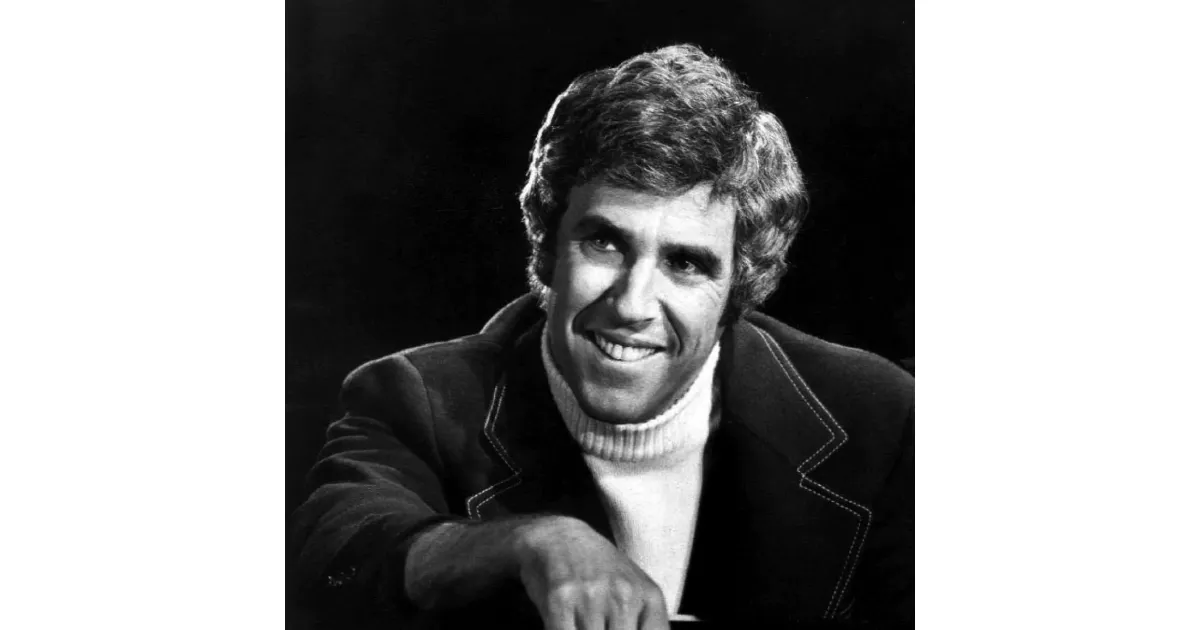Burt Bacharach was a highly influential American composer, songwriter, producer, and pianist. He began his career in the 1950s and, often collaborating with lyricist Hal David, created hundreds of popular songs. His music stood out due to its distinctive chord progressions, shifting time signatures influenced by jazz, and unique instrumental arrangements for small orchestras. Bacharach also arranged, conducted, and produced much of his own recorded material.
May 12, 1928: Burt Bacharach Born
On May 12, 1928, Burt Freeman Bacharach was born. He would later become a very influential American composer, songwriter, record producer, and pianist.
1937: Lost Horizon released
In 1937, the original Lost Horizon dramatic adventure film, which was later remade as a film-musical in 1973, was released.
1946: Graduation from Forest Hills High School
In 1946, Burt Bacharach graduated from Forest Hills High School in Queens, New York City.
1948: Associate of Music, McGill University
In 1948, Burt Bacharach received his Associate of Music at McGill University in Montreal.
1953: Marriage to Paula Stewart
In 1953, Burt Bacharach married Paula Stewart, marking his first marriage.
1956: First Songs Published
In 1956, Burt Bacharach and Hal David published their first songs as co-writers, including "I Cry More", "The Morning Mail", and "Peggy's In The Pantry".
1956: Joins Marlene Dietrich
In 1956, Burt Bacharach began working with Marlene Dietrich as an arranger and conductor for her nightclub shows, a position recommended by Peter Matz.
1957: Early Collaborations
From 1957, Bacharach and David started collaborating with artists such as Marty Robbins.
1957: "The Story of My Life" becomes a No. 1 hit
In 1957, "The Story of My Life" recorded by Marty Robbins, became a No. 1 hit on the Billboard Country Chart.
1958: Divorce from Paula Stewart
In 1958, Burt Bacharach divorced Paula Stewart, ending their five-year marriage.
1961: Association with Dionne Warwick Begins
In 1961, Burt Bacharach and Hal David began writing hits specifically for Dionne Warwick, marking the start of a fruitful collaboration.
1961: Discovery of Dionne Warwick
In 1961, Burt Bacharach discovered Dionne Warwick, who was then a session backup singer, and released "Move It on the Backbeat" under the name Burt and the Backbeats with Dionne and Dee Dee Warwick.
1961: Success with Bob Hilliard
In 1961, Burt Bacharach found success writing songs with lyricist Bob Hilliard, including "Please Stay" and "Tower of Strength".
1962: Success with Bob Hilliard
In 1962, Burt Bacharach found success writing songs with lyricist Bob Hilliard, including "Any Day Now (My Wild Beautiful Bird)" and "Mexican Divorce".
1962: Solo Debut of Dionne Warwick
In 1962, Dionne Warwick made her solo recording debut with "Don't Make Me Over", which became her first hit, after Bacharach and David formed Blue JAC Productions and signed her.
1963: Early Collaborations
Until 1963, Bacharach and David worked with artists such as Marty Robbins, Perry Como, Gene McDaniels, and Jerry Butler.
1965: Marriage to Angie Dickinson
In 1965, Burt Bacharach married actress Angie Dickinson, beginning a 16-year marriage.
1965: First Solo Album Released
In 1965, Burt Bacharach released his first solo album, Hit Maker!: Burt Bacharach Plays the Burt Bacharach Hits, on Kapp Records.
1966: Television Musical On the Flip Side
In 1966, Burt Bacharach and David Merrick wrote the television musical On the Flip Side for the anthology program ABC Stage 67.
1966: Film Score for After the Fox
In 1966, Burt Bacharach wrote the film score for the heist comedy After the Fox.
1966: Birth of Daughter Lea Nikki Bacharach
In 1966, Burt Bacharach's daughter, Lea Nikki Bacharach, was born prematurely. She had Asperger syndrome.
1967: Bacharach Scores Casino Royale
In 1967, Burt Bacharach did the score for James Bond parody film Casino Royale. This film inspired his later cameos in the Austin Powers movies.
1967: Signs with A&M Records
In 1967, Burt Bacharach signed with A&M Records as both an artist and a producer, recording several solo albums until 1978.
1967: Film Score for Casino Royale
In 1967, Burt Bacharach wrote the film score for the James Bond spy parody Casino Royale, including "The Look of Love".
1968: Broadway Musical Promises, Promises
In 1968, Burt Bacharach and Hal David collaborated with Broadway producer David Merrick on the musical Promises, Promises, which yielded two hits.
1968: "This Guy's in Love with You" Reaches No. 1
In 1968, Herb Alpert's recording of Bacharach and David's "This Guy's in Love with You" reached the top spot on the U.S. Billboard Hot 100 pop singles chart.
1968: Stan Getz Album
In 1968, jazz musician Stan Getz recorded twelve Bacharach and David songs for "What the World Needs Now: Stan Getz Plays Burt Bacharach and Hal David".
November 1969: TV Specials
Beginning in November 1969, Burt Bacharach and his music were the focus of multiple U.S. network television specials.
1969: "Raindrops Keep Fallin' on My Head" Tops Charts
In 1969, "Raindrops Keep Fallin' on My Head", performed by B.J. Thomas, became a Billboard Hot 100 hit.
1969: Oscar and Grammy Wins
In 1969, Bacharach and David's "Raindrops Keep Fallin' on My Head" won an Oscar, and they also received a Grammy for Best Cast album for Promises, Promises.
1969: Nikki Becomes ABC Movie of the Week Theme
In 1969, Harry Betts arranged Burt Bacharach's instrumental composition "Nikki" into a new theme for the ABC Movie of the Week television series.
1970: Newsweek Cover Story
In 1970, Newsweek magazine featured Burt Bacharach in a lengthy cover story entitled "The Music Man 1970".
1970: "(They Long to Be) Close to You" Tops Charts
In 1970, The Carpenters' version of "(They Long to Be) Close to You", written by Burt Bacharach, reached the top of the Billboard Hot 100.
1971: Appearance on Singer Presents Burt Bacharach
In 1971, Barbra Streisand appeared on the special Singer Presents Burt Bacharach, where they discussed their careers, favorite songs, and performed together.
1971: Warwick Signs with Warner Bros.
In 1971, Dionne Warwick signed a lucrative contract with Warner Bros. Records that depended on having Bacharach and David as her production team.
1972: End of Prime Collaboration with Dionne Warwick
By 1972, Burt Bacharach and Hal David's most prolific period of writing specifically for Dionne Warwick came to an end, though their collaboration had begun in 1961.
1973: Lost Horizon Film-Musical
In 1973, Burt Bacharach and Hal David wrote the songs for Lost Horizon, a film-musical remake. Conflicts during production strained their relationship.
January 1974: TV Specials
Ending in January 1974, Burt Bacharach and his music were the focus of multiple U.S. network television specials.
1974: Reunion with Warwick
Despite ongoing lawsuits, in 1974, Burt Bacharach and Dionne Warwick reunited to record three new songs for Warner Brothers, though they remained unreleased until 2013.
1975: Bacharach Writes with Other Lyricists
From 1975, Burt Bacharach began writing songs with various lyricists, including Paul Anka, James J. Kavanaugh, Norman Gimbel, Libby Titus, Anthony Newley, and Neil Simon.
1975: Reunion with David
In 1975, Burt Bacharach and Hal David reunited briefly to write and produce Stephanie Mills' second album, For The First Time, released by Motown.
1976: End of ABC Movie of the Week
In 1976, the ABC Movie of the Week, for which Harry Betts arranged Burt Bacharach's instrumental composition "Nikki" into a new theme, ended.
1978: End of A&M Recording
In 1978, Bacharach stopped recording albums at A&M Records.
1980: Bacharach's Solo Albums Fail to Yield Hits
By 1980, Burt Bacharach's solo albums from the late 1970s, including "Futures" and "Woman," had failed to produce any major hits, marking a period of relative commercial disappointment in his solo career.
1980: First Collaboration with Carole Bayer Sager
In 1980, Burt Bacharach and Carole Bayer Sager collaborated for the first time on "Where Did the Time Go" by The Pointer Sisters, signaling the beginning of a successful partnership.
1981: Divorce from Angie Dickinson
In 1981, Burt Bacharach divorced Angie Dickinson, ending their 16-year marriage.
1981: Bacharach Produces Bayer Sager's Album
In 1981, Burt Bacharach produced Carole Bayer Sager's album "Sometimes Late at Night", co-writing 11 of the songs. The album received critical acclaim and was considered a classic of adult contemporary music.
1981: "Arthur's Theme (Best That You Can Do)" Tops Charts
In 1981, Christopher Cross's "Arthur's Theme (Best That You Can Do)", co-written by Burt Bacharach, topped the Billboard Hot 100.
1982: Marriage to Carole Bayer Sager
In 1982, Burt Bacharach married lyricist Carole Bayer Sager, starting a nine-year marriage.
1982: Ronnie Milsap Covers Any Day Now
In 1982, Ronnie Milsap released a country version of "Any Day Now", contributing to the revival of Burt Bacharach's earlier hits by other artists.
1983: Naked Eyes Cover Remind Me
In 1983, Naked Eyes had a pop hit with their version of "(There's) Always Something There to Remind Me", continuing the trend of artists reviving Burt Bacharach's earlier hits.
1985: Adoption of Son Cristopher Elton Bacharach
In 1985, Burt Bacharach and Carole Bayer Sager adopted a son, Cristopher Elton Bacharach.
1985: "That's What Friends Are For" Reunites Bacharach and Warwick
In 1985, the hit song "That's What Friends Are For" reunited Burt Bacharach and Dionne Warwick, marking a significant reunion in their professional relationship.
1986: "That's What Friends Are For" and "On My Own" Top Charts
In 1986, both "That's What Friends Are For" (Warwick) and "On My Own" (Carole Bayer Sager) topped the Billboard Hot 100.
1991: Divorce from Carole Bayer Sager
In 1991, Burt Bacharach divorced Carole Bayer Sager, ending their nine-year marriage.
1993: Bacharach & David Reunite to Write Song for Warwick Album
In 1993, Burt Bacharach and Hal David briefly reunited to write a song for a Dionne Warwick album, marking a temporary rekindling of their partnership after it had effectively ended. This was one of two reunions after their partnership had effectively ended.
1993: Marriage to Jane Hansen
In 1993, Burt Bacharach married his fourth wife, Jane Hansen.
1995: Birth of Daughter Raleigh
In 1995, Burt Bacharach and Jane Hansen had a daughter, Raleigh.
1996: Partnership with Elvis Costello
In 1996, Burt Bacharach formed a songwriting partnership with Elvis Costello, initially to write "God Give Me Strength" for the film "Grace of My Heart", marking a new phase in Bacharach's career. This film was based on songwriters like Carole King and Bacharach.
1996: Bacharach and Warwick Concerts in Las Vegas, Los Angeles, and New York City
In 1996, Burt Bacharach occasionally joined Dionne Warwick for sold-out concerts in Las Vegas, Los Angeles, and New York City, including a performance at the Rainbow Room.
1997: Austin Powers: International Man of Mystery Release
In 1997, "Austin Powers: International Man of Mystery" was released, a film partially inspired by Burt Bacharach's song "The Look of Love" and featuring a cameo appearance by Bacharach himself.
1998: Bacharach and Costello Release Album Painted from Memory
In 1998, Burt Bacharach and Elvis Costello released the album "Painted from Memory", which continued in the pop style of the 1960s and 1970s. The song "I Still Have That Other Girl" won a Grammy.
1998: Rhino Records Releases The Look of Love Box Set
In 1998, Rhino Records released a 3-CD box set, "The Look of Love", featuring original recordings of Burt Bacharach's best-known songs.
1999: Bacharach & David Reunite for "Isn't She Great" Soundtrack
In 1999, Burt Bacharach and Hal David reunited to write two songs for the soundtrack of the film "Isn't She Great", marking a brief return to collaboration after their successful partnership had ended.
2003: Bacharach Arranges and Produces Ronald Isley's Album
In 2003, Burt Bacharach arranged and produced Ronald Isley's album "Here I Am", featuring Isley singing Bacharach's 1960s-era hits.
2005: Bacharach Releases Solo Album At This Time
In 2005, Burt Bacharach released his solo album "At This Time", a departure from past works, featuring his own lyrics and political themes, with guest appearances by Elvis Costello, Rufus Wainwright, and Dr. Dre.
2006: Bacharach Appears on American Idol
In 2006, Burt Bacharach appeared as a celebrity performer and guest vocal coach on the television show "American Idol", with an entire episode dedicated to his music.
2007: Death of Daughter Lea Nikki Bacharach
In 2007, Burt Bacharach's daughter, Lea Nikki Bacharach, committed suicide after struggling with depression for many years.
2009: Bacharach Produces Karima Ammar's Debut Single
In early 2009, Burt Bacharach worked with Italian soul singer Karima Ammar and produced her debut single, "Come In Ogni Ora".
2012: Gershwin Prize for Popular Song
In 2012, Burt Bacharach and Hal David received the Library of Congress Gershwin Prize for Popular Song, a first for a songwriting team.
2012: Sandy Hook Elementary School shooting
In 2012, the Sandy Hook Elementary School shooting happened. In 2018, Burt Bacharach would release "Live to See Another Day", with proceeds benefiting the Sandy Hook Promise charity.
2013: Bacharach's Memoir
In 2013, Burt Bacharach explained the 1973 conflict with Hal David over Lost Horizon profits in his memoir.
2013: Bacharach's Autobiography Published
In 2013, Burt Bacharach's autobiography, "Anyone Who Had a Heart," was published, offering insights into his life and career.
2013: Unreleased songs released
In 2013, three songs written in 1974 by Burt Bacharach and Dionne Warwick were released for Warner Brothers.
2013: Bacharach Discusses Breakup with David
In a 2013 interview with Mitch Albom, Burt Bacharach discussed the breakup of his artistic partnership with Hal David, suggesting that they had run out of inspiration by the time they stopped working together.
June 2015: Bacharach Performs at Glastonbury Festival
In June 2015, Burt Bacharach performed at the Glastonbury Festival in the UK, showcasing his enduring appeal to a wide audience.
2015: Rolling Stone Ranking
In 2015, Rolling Stone ranked Burt Bacharach and Hal David at number 32 on their list of the "100 Greatest Songwriters of All Time".
2016: Bacharach Composes Score for Film A Boy Called Po
In 2016, Burt Bacharach, at 88 years old, composed and arranged his first original score in 16 years for the film "A Boy Called Po" with composer Joseph Bauer, marking a return to film scoring after a long hiatus.
September 1, 2017: Release of Bacharach's Score for A Boy Called Po
On September 1, 2017, Burt Bacharach's score for the film "A Boy Called Po" was released, featuring the theme song "Dancing with Your Shadow" performed by Sheryl Crow.
2018: Bacharach and Costello Reunite for Costello's Album
In 2018, Burt Bacharach and Elvis Costello reunited for Costello's album, "Look Now", working together on several tracks.
2018: Bacharach Releases Live to See Another Day
In 2018, Burt Bacharach released "Live to See Another Day", co-written with Rudy Pérez, dedicated to survivors of gun violence in schools, with proceeds benefiting the Sandy Hook Promise charity.
July 2020: Bacharach Collaborates with Daniel Tashian on Blue Umbrella EP
In July 2020, Burt Bacharach collaborated with Daniel Tashian on the EP "Blue Umbrella", marking his first new material in 15 years.
February 8, 2023: Burt Bacharach Death
On February 8, 2023, Burt Bacharach, the highly influential American composer, songwriter, record producer, and pianist, passed away.
March 2023: Release of The Songs of Bacharach & Costello
In March 2023, "The Songs of Bacharach & Costello", a collection of Burt Bacharach's collaborations with Elvis Costello, was released, including tracks from the proposed stage musical "Taken From Life".
Mentioned in this timeline

Adele Laurie Blue Adkins is a highly acclaimed English singer-songwriter...

Dr Dre born Andre Romell Young is an influential American...

The Billboard Hot is the primary music chart in the...
American Idol is a singing competition TV series created by...

Barbra Streisand is a highly accomplished American entertainer with a...

Las Vegas Nevada's most populous city and the seat of...
Trending

51 minutes ago Storm Causes Power Outages Across Central Coast and SLO County, Bringing Down Trees

2 hours ago Iva Jovic triumphs over Rakhimova in Dubai, reveals Pegula observation.

2 hours ago Andreeva vs. Cristian: WTA Dubai 2026 Prediction, Odds, and Match Preview.

2 hours ago Mirra Andreeva embraces attention, aims Dubai title defense, draws inspiration from LeBron James.

3 hours ago Severe Thunderstorm Warning Issued for Central California; Funnel Clouds Possible, Gusty Showers Expected

3 hours ago Iva Jovic Observed Jessica Pegula; Jovic Wins in Dubai First Round.
Popular

Jesse Jackson is an American civil rights activist politician and...
Randall Adam Fine is an American politician a Republican who...

Pam Bondi is an American attorney lobbyist and politician currently...

Barack Obama the th U S President - was the...

Kid Rock born Robert James Ritchie is an American musician...

XXXTentacion born Jahseh Dwayne Ricardo Onfroy was a controversial yet...
